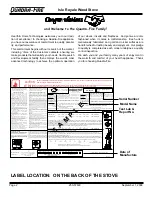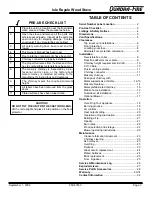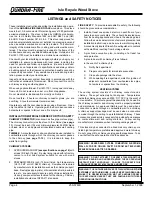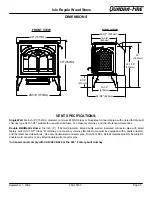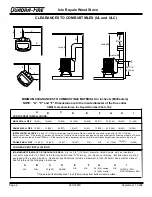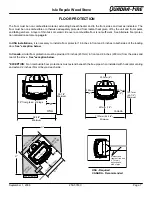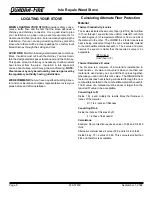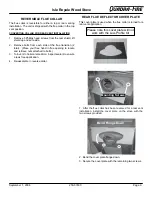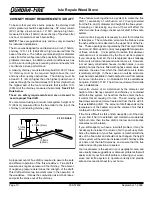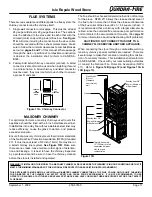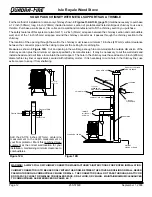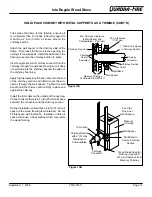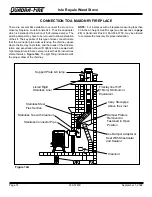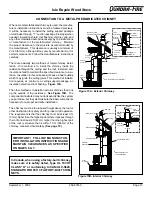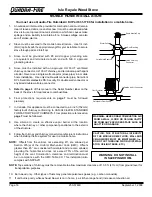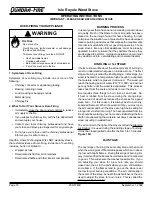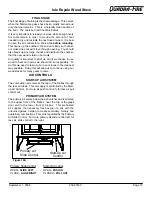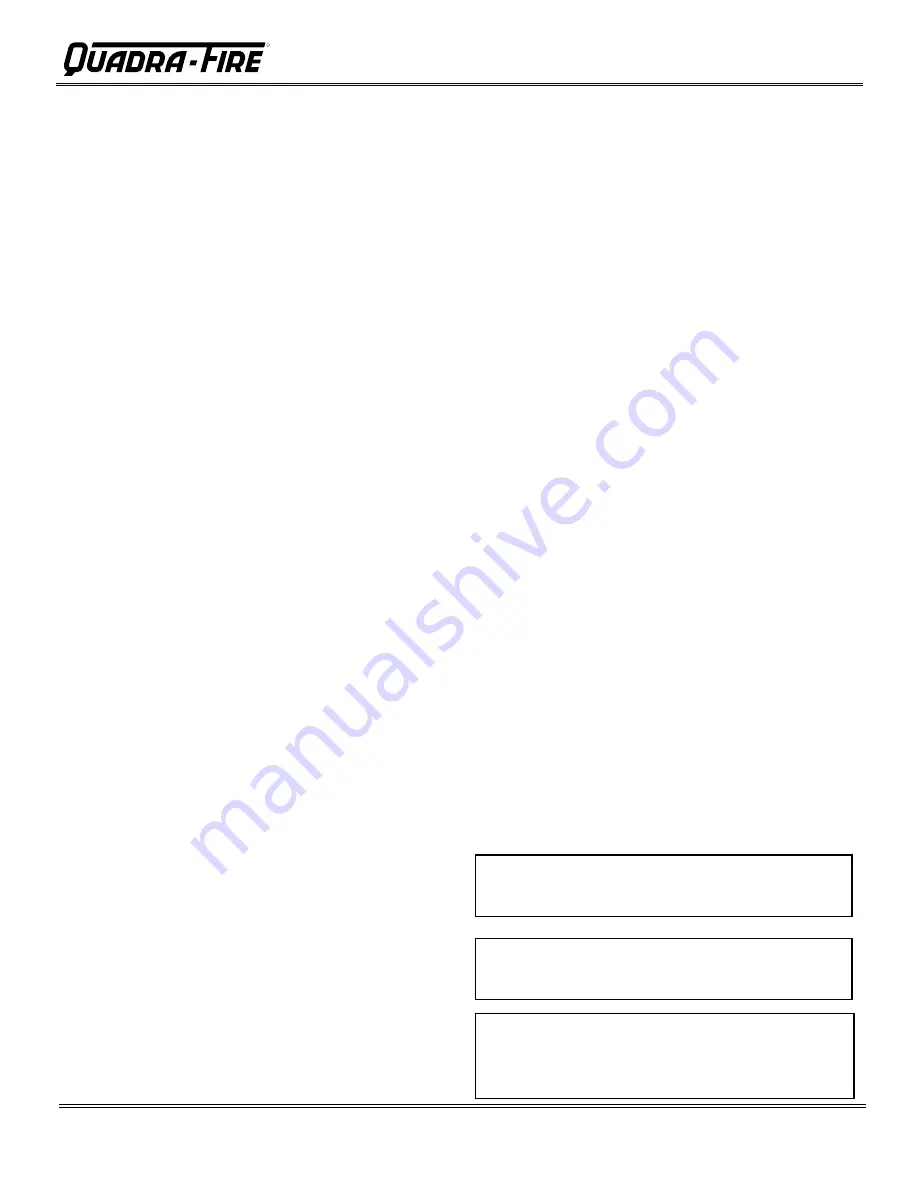
R
Page 4
September 1, 2008
Isle Royale Wood Stove
250-5763C
LISTINGS and SAFETY NOTICES
WARNING !
DO NOT ATTEMPT TO OPERATE THIS WOODSTOVE
WITHOUT READING AND UNDERSTANDING THESE OPERATING
INSTRUCTIONS THOROUGHLY. FAILURE TO OPERATE THIS
APPLIANCE PROPERLY MAY CAUSE A HOUSE FIRE.
WARNING ! THE OUTSIDE SURFACES OF THIS UNIT WILL BECOME
ExTREMELY HOT DURING USE. ALWAYS KEEP CHILDREN AWAY
WHILE IT IS OPERATING AND DO NOT LET ANYONE OPERATE
THIS APPLIANCE UNLESS THEY ARE FAMILIAR WITH THESE
OPERATION INSTRUCTIONS.
WARNING! NEVER DRAW OUTSIDE COMBUSTION AIR FROM A
WALL, FLOOR OR CEILING CAVITY OR FROM ANY ENCLOSED
SPACE SUCH AS AN ATTIC OR GARAGE.
These installation instructions describe the installation and opera
-
tion of the
QUADRA-FIRE ISLE ROYALE
woodstove. This stove
meets the U.S. Environmental Protection Agency’s 1990 particulate
emission standards. The stove is listed by OMNI-Test Laborato
-
ries, Inc. to UL Safety Standard 1482, and ULC S627, and (UM)
84-HUD., Report number 061-S-18-2. This stove is approved for
mobile home installations when not installed in a sleeping room and
when an outside combustion air inlet is provided. The structural
integrity of the mobile home floor, ceiling, and walls must be main
-
tained. The stove must be properly grounded to the frame of the
mobile home and only use listed double-wall pipe. Outside Air Kit,
Part 831-1780 must be installed in a mobile home installation.
Check with your local building code agency before you begin your
installation to ensure compliance with local codes, including the
need for permits and follow-up inspections. Be sure local build
-
ing codes do not supersede UL specifications and always obtain
a building permit so that insurance protection benefits cannot be
unexpectedly cancelled. If any assistance is required during instal
-
lation, please contact your local dealer.
Inspect and clean vent system frequently in accordance with the
instructions contained in this manual. Do not connect this unit to
a chimney serving another appliance.
When using optional Blower, Part 831-1701, route power cord away
from unit. Do not route cord under or in front of appliance.
Do not elevate fire. Build wood fire directly on firebrick.
Do not overfire - if heater or chimney connector glows, you are
overfiring. Stove thermometer recommended.
Operate only with the door closed unless using a firescreen. Open
only to add fuel to the fire. Operating with the door open can cause
hot embers or sparks to fall out and a fire may result.
INSTALLATION MATERIALS NEEDED FOR YOUR SAFETY
CHIMNEY CONNECTOR
(also known as flue pipe or stove pipe):
The chimney connector joins the stove to the chimney (
see page
11)
. It must be 6 inch (152mm) minimum diameter 24 MSG black
or blued steel, or an approved air-insulated double wall venting
pipe.
THIMBLE
: A manufactured or site-constructed device installed in
combustible walls through which the chimney connector passes
to the chimney
(see page 11-12)
. It is intended to keep the
walls from igniting.
CHIMNEY SYSTEMS
:
1. APPROVED MASONRY
(see specifications on page 14)
with
at least 5/8 inch (16mm) fire clay lining joined with refractory
cement or other listed system suitable for use with wood
stoves.
2. PREFABRICATED 6 inch (152mm) listed high temperature
(UL 103 HT or ULC S629) chimney. Components required
by manufacturers for installation such as the chimney support
base, firestop (as appropriate), attic insulation shield, insulated
tee, etc., are necessary to assure a safe chimney installation.
Use only components manufactured for the chimney. Chimney
installation should meet NFPA 211 standards.
FIRE SAFETY
: To provide reasonable fire safety, the following
should be given serious consideration:
1. Install at least one smoke detector on each floor of your
home to ensure your safety. They should be located away
from the heating appliance and close to the sleeping areas.
Follow the smoke detector manufacturer’s placement and
installation instructions, and be sure to maintain regularly.
2. A conveniently located Class A fire extinguisher to contend
with small fires resulting from burning embers.
3. A practiced evacuation plan, consisting of at least two
escape routes.
4. A plan to deal with a chimney fire as follows:
In the event of a chimney fire:
A. Notify fire department.
B. Prepare occupants for immediate evacuation.
C. Close all openings into the stove.
D. While awaiting fire department, watch for ignition of
adjacent combustibles from overheated stove pipe,
hot embers or sparks from the chimney.
VENTING SYSTEM
The venting system consists of a chimney connector and a
chimney. These get extremely hot during use. Temperatures
inside the chimney may exceed 2000
°
F (1100
°
C) in the event of
a creosote fire. To protect against the possibility of a house fire,
the chimney connector and chimney must be properly installed
and maintained. An approved thimble must be used when a
connection is made through a combustible wall to a chimney.
A chimney support package must be used when a connection
is made through the ceiling to a prefabricated chimney. These
accessories are absolutely necessary to provide safe clearances
to combustible wall and ceiling material. Follow venting
manufacturer’s clearances when installing venting system.
This stove may be connected to a lined masonry chimney or a
listed high temperature prefabricated approved metal chimney.
Do not connect it to a chimney serving another appliance. To do
so will affect the safe operation of both appliances.


